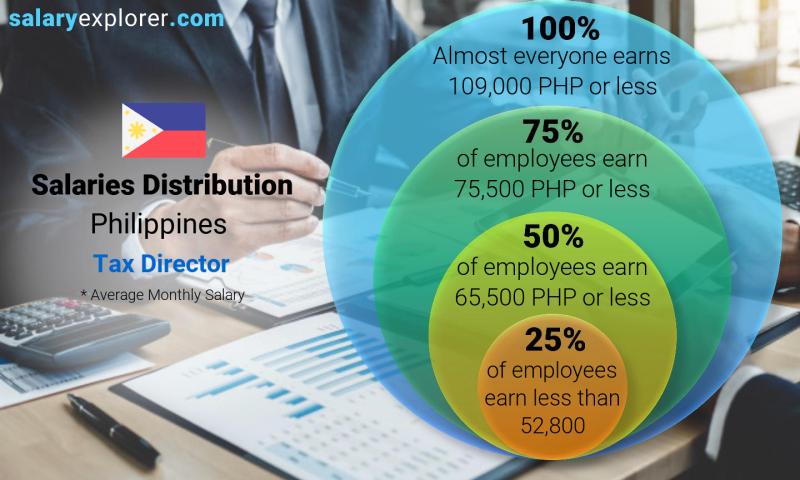In the Philippines, individuals earning an annual income below Php 250,000 are exempt from paying income tax, as of the latest tax reforms under the TRAIN Law.

Income Tax System in the Philippines
Types of Taxes
In the Philippines, the tax system is quite diverse, covering different kinds of earnings and transactions. Some of the primary types of taxes that are directly relevant to individual income are:
- Income Tax: Levied on all forms of income like salaries, businesses, and investments. This is the tax most people are concerned with when talking about minimum salary for taxation.
- Value Added Tax (VAT): A consumption tax placed on a product whenever value is added at each stage of the supply chain.
- Capital Gains Tax: A tax on the profit when you sell something that’s increased in value.
- Withholding Tax: A tax withheld by the payer and paid to the taxation authorities. Often applicable to employees and freelance workers.
You can read more about Types of Taxes in the Philippines for an in-depth understanding.
Tax Brackets
In the Philippines, the tax rate varies depending on your annual taxable income.
- Up to ₱250,000: No tax
- Over ₱250,000 to ₱400,000: 20% of the amount in excess of ₱250,000
- Over ₱400,000 to ₱800,000: 25% of the amount in excess of ₱400,000
- Over ₱800,000 to ₱2 million: 30% of the amount in excess of ₱800,000
- Over ₱2 million to ₱8 million: 32% of the amount in excess of ₱2 million
- Over ₱8 million: 35% of the amount in excess of ₱8 million
Determining the Minimum Salary for Taxation
Understanding the minimum salary requirement for taxation is crucial for planning your finances and ensuring compliance with tax regulations in the Philippines. It’s especially vital for new entrants into the workforce, freelancers, or anyone unsure about their tax liabilities.
Exemptions and Deductions
Understanding tax exemptions and deductions is crucial for determining your net taxable income. The Philippine government offers various forms of relief to lessen the tax burden on its citizens. These can include:
- Personal Exemptions: Single or married, you may be entitled to certain exemptions based on your personal status.
- Dependent Exemptions: For each qualified dependent, additional deductions from income are possible.
- Health and Insurance Deductions: Premiums paid on health and/or life insurance can often be deducted.
- SSS, PhilHealth, and Pag-IBIG Contributions: Contributions to these social safety nets are deductible to a certain extent.
You can read further about Tax Deductions in the Philippines to get a more detailed view.
Taxable and Non-Taxable Income
Income categories can be divided into taxable and non-taxable segments. Knowing which parts of your income are subject to tax helps in calculating your net taxable income.
- Taxable Income: This includes your basic salary, bonuses, and any other financial compensations from your employer.
- Non-Taxable Income: Some income types are exempt from tax, like de minimis benefits, 13th-month pay up to a certain amount, and other allowances.
- Investment Earnings: While some are tax-free, like earnings from certain types of government bonds, others are taxable.
Understanding Tax Liabilities
Tax liabilities are not just about the tax rates; they encompass various facets like your annual tax returns, withholding taxes, and any special conditions that might apply to you. Grasping these aspects can provide a comprehensive understanding of your obligations to the government.
Annual Tax Return
Filing your annual tax return is an essential part of meeting your tax responsibilities. Here are some key points:
- Deadline: The deadline for filing is usually on April 15th of every year.
- Tax Forms: Various forms like BIR Form 1700 or 1701 are used, depending on your employment status.
- Supporting Documents: You may need to attach payslips, certificates of tax withheld, and other relevant documents.
Withholding Tax
Your employer typically handles withholding tax, deducting it from your salary before you receive it. Here’s what you need to know:
- Rate: Varies depending on your income bracket.
- Monthly Deductions: It is generally deducted from your monthly salary.
- Year-End Adjustment: At the end of the year, you’ll either receive a refund or have to pay extra, depending on the total withheld tax versus your actual tax liability.

Special Conditions
Certain groups of people have special tax conditions applied to them due to their work nature or other factors.
Overseas Filipino Workers (OFWs)
OFWs generally enjoy some tax exemptions, especially if the country they are working in has a tax treaty with the Philippines.
- Tax Exemptions: Many OFWs do not have to pay Philippine income tax if they are taxed in their host country.
- Remittances: Money sent back to the Philippines may also be subject to certain exemptions or deductions.
For more, visit OFWs and Philippine Taxes.
Self-employed Individuals
- Quarterly Payments: Unlike salaried workers who have taxes withheld, self-employed individuals often have to make quarterly estimated tax payments.
- Deductions: More types of expenses are deductible for self-employed individuals compared to salaried workers.
Recent Changes in Philippine Tax Laws
Staying updated with the latest changes in tax laws is critical for financial planning and tax compliance. The Philippine government has implemented significant tax reforms recently, notably the TRAIN Law and the CREATE Law. Understanding these can help you adapt your financial strategies accordingly.
TRAIN Law
The Tax Reform for Acceleration and Inclusion (TRAIN) Law, implemented in 2018, was one of the first comprehensive tax reform packages.
- Increased VAT Exemptions: More goods and services became VAT-exempt.
- Personal Income Tax: The law modified personal income tax brackets to make it more progressive.
- New Excise Taxes: Additional taxes on items like fuel, tobacco, and sugary drinks.
You can delve deeper into this subject by visiting TRAIN Law on Wikipedia.
CREATE Law
The Corporate Recovery and Tax Incentives for Enterprises (CREATE) Law was signed into law in 2021.
- Corporate Income Tax: The law reduces the corporate income tax rates, making it favorable for business investments.
- Tax Incentives: Offers a wide range of tax incentives for eligible businesses, including those in special economic zones.
- Simplification: Aims to simplify the tax system to make it more manageable for smaller businesses.
How to Calculate Your Taxable Income
Calculating your taxable income is a critical step for understanding your tax liabilities and planning your finances. Knowing how to break down your income and identify allowable deductions can make the process less daunting.
Income From Salary
Your salary serves as the base figure for calculating your income tax. To arrive at your taxable salary income, you need to consider:
- Gross Salary: This includes your basic pay, allowances, and any bonuses.
- Less Deductions: Subtract mandatory contributions like SSS, PhilHealth, and Pag-IBIG, as well as any qualifying personal exemptions.
- Net Taxable Salary: The final figure is your net taxable income from salary.
If you’re looking for a guide to break down your income and liabilities, check out Income Tax Calculation in the Philippines.
Other Sources of Income
- Business Income: If you have a business, include your net income after allowable business expenses.
- Investment Income: Earnings from investments like stocks or bonds can be taxable, depending on the type of investment.

Filing Taxes: Procedures and Deadlines
Adhering to the correct procedures and meeting the deadlines for filing taxes are crucial for avoiding penalties and ensuring compliance with the Philippine tax system. Here’s a rundown of what you should know:
Tax Filing Platforms
Several platforms are available for the purpose of filing taxes, making the process more accessible and streamlined.
- eFPS (Electronic Filing and Payment System): An online system for electronic filing and payment of taxes.
- eBIRForms: Another online application that enables you to fill out tax forms and compute tax liabilities.
- Manual Filing: Traditional filing of paper forms is also an option, especially for those who are not tech-savvy.
You can read more on the different platforms on the Philippine Tax Filing Systems Wikipedia page.
Penalty for Late Filing
Late filing or failing to file can have significant repercussions, including:
- Monetary Fines: Fines can range from a few thousand pesos to a more substantial amount depending on the type of tax and duration of delay.
- Interest Rates: Interest can accrue on the outstanding tax liability.
- Legal Consequences: Severe cases of non-compliance could even result in legal action.